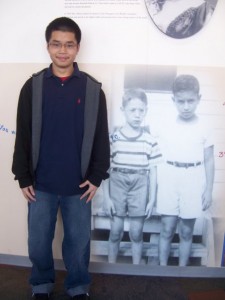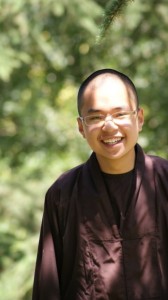
by David Waters
A 10-year-old boy held a Buddhist monk’s hand as they walked with hundreds of others slowly, quietly, peacefully through Overton Park in 2002, in part to honor the nonviolent ministry of Dr. Martin Luther King Jr.
As they passed through the sunlight and shadows of the trees like a gentle breeze that day, five miles from where King was assassinated, 60 miles from the boy’s home in North Mississippi, 9,000 miles from the monk’s home in Vietnam, neither could have imagined where they would find themselves this past week, more than a decade later,
The monk, Thich Nhat Hanh, now 86, one of the world’s most revered spiritual leaders, a man deeply influenced by King’s life and death, leading a mindfulness retreat for a thousand people at a Vietnamese Buddhist monastery in North Mississippi.

The boy, Alan Ho, now 21 and a Buddhist monk, is participating in the retreat at the center co-founded by his father, Bihn Ho, a Vietnamese immigrant who 11 years ago took his young son to a peace walk in Overton Park and was inspired to bring Nhat Hanh’s dharma teachings to the Delta.
“We view it as a homecoming of the sangha, the beloved community,” said Ho, whose monk name is Brother Phap Trien, said Saturday afternoon as he sat with a friend on the grounds of the Magnolia Grove Meditation Practice Center near Batesville., Miss., home to 32 Vietnamese Buddhist monks and nuns since 2010.
For the past week, they’ve been joined by 100 other monastics and 900 other people from across the country who came to learn and practice the art of mindful living with the Zen Master himself, Thich Nhat Hanh, the West’s second-most influential Buddhist after the Dalai Lama.
Nhat Hanh, who survived three wars in his Vietnamese homeland, led the Vietnamese Buddhist delegation at the Paris Peace Talks to end the Vietnam War. For his opposition to the war, he was exiled from his homeland for more than three decades.
Forty years after the Paris Peace Accords were signed in 1973, Nhat Hanh is on a three-month teaching tour of North America. He’d led a day of mindfulness at the World Bank headquarters in Washington, and at the Harvard School of Public Health in Boston.
For the past week, he’s led the “Healing Yourself is Healing the World” Retreat at Magnolia Grove, one of three such centers in North America. The retreat ends Sunday.
Hundreds slept in tents and campers on the wooded 120-acre site. Others stayed in the center’s tiny dorms. Hundreds of others commuted from nearby hotels or their own homes. They woke at 5:15 in the morning and followed a daily schedule that included walking meditations, sitting meditations, working meditations (like mindful dish washing), relaxation exercises — and no cellphone service.

“We want to give people who come a little taste of what it means to live more mindfully and peacefully. It’s what I used to call a Sunday feeling,” said Sister True Dedication, a nun formerly known as Natasha, who grew up in Anglican and Protestant churches in England. “Everyone’s life is so busy. We know you can’t always stop what you’re doing. We’re here to help you slow down, at least stop running for a week, and be present.”
The presence of the soft-spoken and playful Nhat Hanh, who will be 87 next month, gave retreatants more than a taste of Buddhist principles and practices. They called him Thay (the Vietnamese words for teacher, pronounced like Tie).
Every morning, hundreds of people gathered in the new Rising Tide Meditation Hall, sitting quietly, cross-legged on floor cushions or in the back of the room on folding chairs, straining to hear the soft-spoken Thay’s one- to -two-hour dharma teachings.
“A good dharma talk is like rain,” the monk told hundreds who sat on cushions on the floor or in folding chairs in the back of the brand-new Rising Tide Meditation Hall. “It waters the seeds of consciousness, seeds of love, brotherhood, compassion.”
Thay told stories.
Like the day the Buddha and several of his followers encountered a distraught man who had lost four of his cows and, he feared, his livelihood. “You are lucky you don’t have any cows to lose,” Buddha told his disciples after the man departed.
He responded to questions, sometimes wryly.
“Thay, if I am stuck between two paths, what do you think I should do?” one young retreatant asked.
“You have to choose one,” said Nhat Hanh, who shaves his head and wears a simple brown rode like all monks and nuns.
He talked about the value of letting go, looking and listening deeply, living in the present moment, being instead of doing, learning to speak, walk, talk and think peacefully.
Someone asked him if Buddhists should engage in acts of civil disobedience to protest war or other acts of violence.
“The better way is to set an example for people to follow,” Thay said. “Create a community of peace, of brotherhood and sisterhood, a beloved community that will show people a better way to live.”
Nhat Hanh said he began using the phrase beloved community when he met King in 1965 and again in 1966.

“I remember,” he said, “the last time I met Dr King, we spoke about community-building. Unfortunately King was killed not long after that, and I vowed to myself, that even in exile, I would redouble my efforts, and put all my energy into the practice of building the Beloved Community we had discussed together.”
King, who won the Nobel Peace Prize in 1964, nominated Nhat Hanh for the prize in 1967 at the height of the war. King credited Nhat Hanh with his own decision to publicly oppose the Vietnam War that year. “I do not personally know of anyone more worthy of the Nobel Peace Prize than this gentle Buddhist monk from Vietnam,” King wrote to the Nobel committee. No one was awarded the prize that year.
“Thay told Dr. King he was a bodhisattva (an enlightened being),” said Sister Chan Khong, who has worked closely with Nhat Hanh since the late 1950s.
Last week, a dozen monks and nuns visited the National Civil Rights Museum, to honor their teacher and his friend.
“Thay couldn’t go, so I held him in my heart as I approached this hallowed spot in walking meditation,” said Sister Peace, formerly known as Jackie, an African-American Catholic woman who gave up life in local politics in Washington D.C., several years ago to become a Buddhist monk.
“Now, to think that so many years later, the peacemaking and community building that this Baptist minister and this Buddhist monk tried to do together is continuing right here. It’s healing work.”
Originally from Faithinmemphis




Share Your Reflections